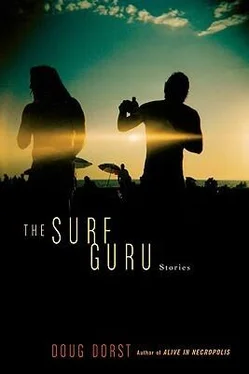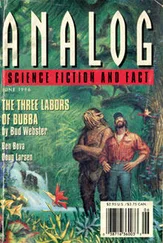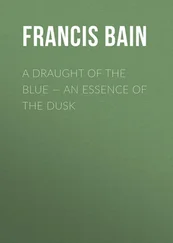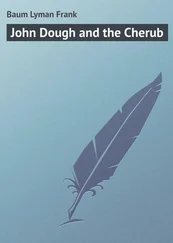Lars watches from the edge of the hotel’s roof, leaning against the railing, surrounded by three young girls, his latest recruits, who comb his beard, brush dirt off his suit, rub his back. I think about approaching him and demanding compensation for his monkey’s theft, but then I spot Ysela standing with her friends across the square from us. I tell Vargas I will return and make my way around the perimeter, crossing between buildings on wooden planks and over the streets on the rope bridges, trying not to look down. I slip through the crowd and tap her on the shoulder. She faces me. Her friends tighten around her and look at me. The disgust in their gazes is obvious.
“I am so sorry,” I whisper to her. “I am proud of what you have done and what you will do. I think you will be an excellent teacher.”
I feel her warm breath in my ear as she whispers back, “San Humberto keep you well.” She smells like her mother, like the west wind that brings the winter rains. She kisses me on the cheek and turns back to her friends, who close ranks around her. Some of them are handsome young men. It occurs to me that she could be in love with one of them and I would not know. I do not belong here with her, with them. This saddens me, but the sadness is a new one, soft and muted, sweetly bearable. Ysela has her place, and I have mine. I cross back to the roof of the hotel and rejoin Vargas. He slaps my shoulder, and together we watch the scene below.
A hyena creeps out on the crossbeam of the gallows and begins gnawing on the rope. “Ah,” Vargas says. “They figured it out more quickly this year.” When the bandit’s body falls, there is no sound of impact; it is caught in the air by a dozen snapping jaws and pulled apart. When there is nothing left but bones, the church bells ring. It is time to celebrate.
I watch as people cluster around Lars, congratulating him for the capture of El Gris, fighting for position in his good graces. How can I expect them to do otherwise? He owns the town. This simply is a fact. Vargas and I stand by ourselves, still watching as the hyenas pace the square, licking their mouths, nosing at the dirt, gnawing bone, waiting for whatever it is that comes next. We remain quiet with each other. A light wind blows across the rooftops, cooling me through my wet shirt. It is a wind that promises a thunderstorm, a violent but merciful break in the weather, and I think of all the times I stood on a roof with Madalena and watched the sacrifice with her. When the church bells rang, she would make the Gestures of the Sacred Bones and begin to pray. Maybe it was just the bells ringing and the wind blowing through her hair and her lips forming the words of a prayer, but every time she did this, I thought, Bless the saint, she has never been more beautiful. For the first time I can remember her without anger. My feet throb, and I can feel the dampness of sweat in my boots. Is this is how anger drains away?
Lars is waving his arms animatedly, telling his story for all those people, collecting handshakes and pats on the back. He draws a cigar out of his jacket pocket, and one of the young whores strikes a match for him. He wraps his hand around her skinny wrist and is guiding it toward his face when someone whistles — a fierce whistle that cuts right through the wind and chatter. Lars turns toward the whistle, like a man who assumes all whistles are meant for him.
The apple hits him on the bridge of his nose, and I hear the crunch of bone. Lars recoils as if shot. Blood spills over his blond beard and streaks his white suit.
“Did you see?” I say to Vargas. “My son has good aim.”
Vargas smiles, more to himself than to me, and we watch as the people around Lars wheel around and back, around and back, scanning the dark, trying to figure out where that apple came from, wondering if there will be more.
— after “Paradise” by Alejandro Escovedo
We were almost out of money, so Trace went to steal us another bottle of something. We were celebrating. The holiday weekend was almost over, and the mechanic was due back in town the next morning. We’d finally be able to get back on the road.
I sat on the rear bumper of the van and waited. Smoke from the fireworks still hung in the air. Biggest display in the Mojave, the posters had promised. Maybe it was, but we couldn’t tell. An hour before the show, the sky had curdled into a clump of fog. Fog, in the desert. First time in twenty years, someone said.
I watched the smoke and fog mingle and roll in lazy waves in and out of the orange floodlight of the gas station. All around me were junked cars parked at crazy angles, cracked windshields and fallen bumpers shining in the greasy light. Buicks and Chevys and Pontiacs, all chrome and disappointment. The dirt was speckled with pieces of broken glass. Every breath tasted like gunpowder. We were still thousands of miles from Alaska.
Trace was gone a long time, too long, and I wondered if he’d found a girl and gone off with her. That happened a lot. The last time was in Flagstaff, where he’d hooked up with a tequila-shooting girl who was wispy and tan and blonde, so good-looking that her red eyes and thick liquor-stink just made her seem game and fearless instead of sad. She told us she was from San Diego, on her way east to divinity school. At last call, I saw her lift her skirt and flash Trace her tiger-print panties, and they spent the night in her motel room. I slept in the van. “I don’t understand it,” he said the next day. “I’m a fucked-up-looking guy, but I always get the beautiful ones.” It was true. He was fucked-up-looking — short and puffy, with a half-closed eye and a nose that looked like it’d been hit with a bag of nickels — and he did always get the beautiful ones. And he always seemed genuinely surprised about it. You could tell him to shut up and enjoy his luck, but that never stopped him from wondering out loud.
While I waited for Trace, I ran through the names of the places we’d drive through next: Tehachapi, Bakersfield, Fresno, Modesto, Lodi, Red Bluff, Redding. I’d studied the map, knew the route by heart. I wanted to see all these towns in the rearview, feel them as beats in a rhythm of places passed by, a rhythm as steady and soothing as tires thrumming over pavement joints.

When Trace came back to the van, he was carrying a baby wrapped in a threadbare beach towel. “Hey, Phil,” he said. “Look what I got.” He held it up like it was a carnival prize. The baby’s eyes were shut, but it wrinkled its little fingers open and closed, so I knew it was alive.
“Whose is that?” I said.
“Someone gave it to me.”
“Who?”
“A woman. Outside the liquor store.”
“People don’t just hand out babies,” I said.
“This one did,” he said.
“Take it back.”
“I can’t,” he said. “She drove away.”
“We have to find her,” I said. “People will think we stole it.”
Trace carried the baby as we walked along the road into town. He hummed softly and rocked it in his arms. I kicked at the loose gravel. “The mother,” I said, “was she fat?” The other morning, in the taco place, I’d seen a fat woman chew up a quesadilla and dribble it into her baby’s mouth. Like she thought they were penguins or something. It was all I could do to keep my food down, watching. I wondered if this one might be the penguin baby. I didn’t want any baby, but I especially didn’t want that one.
“No,” Trace said. “She was skinny. Like meth-skinny.”
“Even so,” I said. “We have to get rid of it.”
In the streetlight I could see the baby’s forehead and nose were bright red. The mother, whoever the hell she was, had let the kid get sunburned. Even I knew that was wrong. Still, the baby looked pretty happy. It wasn’t crying. As babies go, this one was pretty mellow.
Читать дальше













